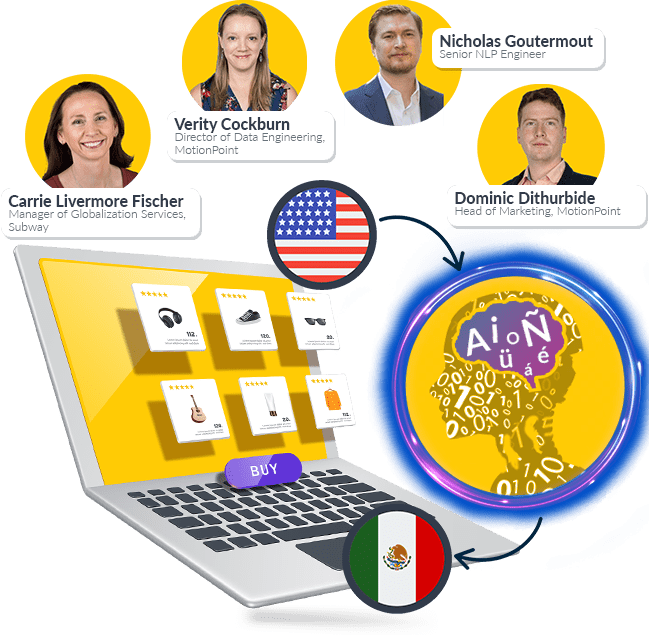Today's digital technologies make it easier than ever for global customers to find the products and services that meet their needs. And they're searching for that information online, in the languages they speak. A recent study has shown that 56% of consumers rated the ability to obtain product information in their preferred language to be even more important than price.
Suppose your company's website isn't localized to appeal to customers willing to purchase based on brand connection to their language. In that case, you're missing a significant opportunity to build your business. However, you are also giving your competitors a significant advantage in the quest to increase market share.
Brass tacks: When you’re expanding globally, investing in website localization services isn’t a nice-to-have. It’s mission-critical.
Why is Localization Important?
Introducing new products to a global marketplace typically requires both translation and localization. Translation converts content from one language into another. Localization moves beyond changing existing content and marketing collateral into another language.
Localization is vital in how it establishes a connection with potential customers on a personal level. This is because the localization process involves understanding how culture and market conditions affect customers' buying behavior and not assuming you'll be successful in your target market simply because you exist there.
The localization process aims to adapt meaning to relevant content for a targeted market. In addition to changing language, localization might incorporate different images, conversions to new measurement systems, time zones or currencies, and different layouts to accommodate language changes (such as if a language is read right to left, or if words in the target language tend to be longer than in the original language).
Below, you'll find examples of the significance of localization. Then, dive deeper into the benefits and advantages of localizing content when planning a global expansion.
Localization is Crucial to Successful Expansion
The localization process is crucial to global expansion. Expanding would be fruitless if potential customers don't or can't understand your content, products, or services. Companies that tend to be the most successful balance the desire to meet global standards with the need for local flexibility. If you're looking to expand and don't prioritize localization, your business can seem static and impersonal to potential customers outside your home base.
Developing a proper localization strategy can assist you as you prepare for expansion. A localization strategy takes a very close look at the who/what/why/when, and how questions you need to answer before you take measures to expand. Developing a localization strategy involves the integration of language translation, image appropriateness, cultural message matching, process definition, and regulatory compliance. Once you work through your strategy, the localization process becomes predictable and repeatable, so you can continuously grow measurably.
Localization is a Growing Global Marketing Trend
These days, global customers expect online content in their preferred language. They quickly navigate away from websites and brands that fail to provide it. Consider these globalization stats:
While 60% of all content on the Internet is in English, native English speakers only make up about 5.4% of the world’s population. Only 25.3% of the Internet market share prefers English-only content, which leaves nearly 75% who prefer to consume content in another language.
China and India are still winning the Internet. China currently has over 1.02 billion online users, while India ranks second with over 658 million. Neither nation uses English as its first language.
Global shopping has gone mobile. More than 55% of global smartphone owners use them to shop online, and they like to do so in their preferred language. Trends like these prove that speaking your customers’ languages through localized content is essential to your marketing success.
Localization Turns Cultural Differences into an Advantage
Why does culturally relevant, localised marketing matter so much? For starters, it can make or break your ability to create genuine connections with consumers.
For example: Imagine that you're sharing content with Italian customers about a Christmastime holiday sale. If you advertise to them the same way you speak to your U.S. customers, you'll have a problem. The U.S. market emphasises Christmas Eve and Christmas Day as key holidays, while Italy puts its attention on January 6-the Epiphany.
A misstep this simple may seem harmless at first glance. But it can undermine your marketing efforts by demonstrating that you don't quite get the Italian market as well as other companies do. Those customers will notice. They won't like it.
When your website is translated and localised for global customers, however, you're proving you understand and care about them. You create stronger bonds with customers that way.
The Benefits of Localization
Localised websites and other digital content enable you to make genuine, authentic connections with consumers and "level up" into advantages like these:
1. Increased trust
You can show that your brand respects other cultures through website translation and localization. According to CSA Research, 60% of non-native English speakers rarely or never buy from English-only websites. In fact, 64% of buyers say they value localized website content. You can gain genuine trust from your target audience through cultural adaptation.
In turn, when trust is enhanced, key performance indicators (KPIs) see a sizable lift. KPIs measure the performance of a company, its activities, processes, and the progress of projects. In order to be significant, KPIs must correlate to quantifiable business goals. Determining the success of any localization program is tied to the overall expectations of the expansion project or business strategy.
The increase in trust localization creates can lead to important retention KPIs improving, including
- Generating higher sales
- Higher customer satisfaction
- Delivering an excellent customer experience
- Increasing net promoter score (NPS)
- Lower attrition rates
2. Easier interaction with your brand
Customers’ lives are influenced by what they use every day—including their preferred social media platforms, mobile sites and more. Content localization makes your online presence available in multiple languages, across all channels, and ensures that your company will be able to reach more people where they live and work. This enhances a positive user experience for global customers and helps them trust your brand.
A positive user experience directly results in an increase in sales conversion rates and engagement rates, as well as lower bounce rates. User experience has become incredibly important, especially when looking at statistics that show how 74% of customers can switch brands if the purchasing process is too difficult for them; or, that 86% of users are inclined to pay more for a great customer experience. It's no wonder that global spending on customer experience has been estimated to reach $640 billion by 2022.
3. Driving better online search results
Localising your online presence isn't limited to what customers can read on your website. With the right translation solution, everything can be localised-images, multimedia, social media, dynamic PDFs and more. Keywords, metadata, and hreflang tags can be localized to improve global SEO efforts and drive engaged global traffic to your website. Once there, global customers will benefit from an enhanced user experience and content that speaks directly to them.
4. Stronger brand consistency
Translating websites for your global markets gives you full control of your message, and delivers a consistent brand experience across all markets. It's easier to ensure your brand messaging is being communicated as you intend, rather than miscommunicated by third-party companies or agencies. Localization takes this a step further, ensuring that the content is not only translated, but accounts for the cultural nuances and preferences of each location. This ensures brand consistency and improves brand image.
5. Better segmentation
Today’s leading website translation services and localization solutions make it easier than ever to share customized messages to customers in different global markets. You can keep control of your online message while catering to regional customer needs-and expanding your business's digital footprint at the same time. This improved ability to segment markets and speak directly to local audiences can enhance the effectiveness of messaging and targeting.
6. More support for in-market teams
Localised websites are not only great resources for consumers; they're great for local sales and support teams as well. A localised site can highlight market-specific products and services, comply with local regulations and legal requirements, and provide information that local marketing teams can draw on as they pursue leads.
Take Advantage of the Benefits of Localization
These days, your company must speak the local languages of your global customers. And you only strengthen your marketing team's reach and success by offering localised online content across every channel, in every market you serve.
To make the most of your online localization efforts, partner with a digital-first translation agency that employs expert human translators hand-in-hand with advanced technology solutions such as translation memory, to get your marketing message to your customers in the languages they prefer. Translation memory is a part of a larger system called a CAT (computer assisted translation) tool, which describes software used to increase translation productivity, catch mistakes, and improve consistency.
Utilizing translation memory helps support the localization process by allowing the re-use of translations for other projects, such as document translation, app localization, image translation, or for translating emails or other content.
MotionPoint provides website localization services that support business localization goals anywhere. MotionPoint's technology minimizes operational complexity and maximizes translation and localization impact, and can provide you with flexible and consistent brand imaging, messaging, and marketing content through global markets.
Last updated on August 05, 2022


